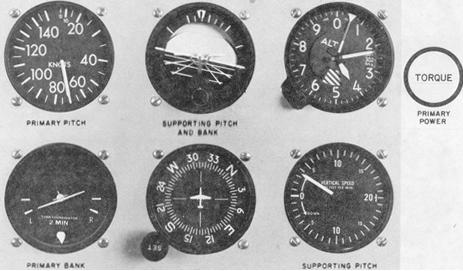
1. Failure to maintain desired rate of turn.
2. Failure to maintain altitude in level turns.
3. Failure to maintain desired airspeed.
4. Variation of rate of entry and recovery.
5. Failure to use proper lead in turns to headings.
6. Failure to properly compute time during timed turns.
7. Failure to use proper leads and lags during compass turns.
8. Improper use of power.
9. Failure to use proper pedal trim.
Unusual Attitudes and Recoveries
Any maneuver not required for normal helicopter instrument flight is an unusual attitude ann may be caused by any one or a combination of such factors as turbulence, disorientation, instrument failure, confusion, preoccupation with cockpit duties, carelessness in cross-checking, errors in instrument interpretation, or lack of proficiency in aircraft control. Due to the instability characteristics of the helicopter, unusual attitudes can be extremely critical. As soon as you detect an unusual attitude, make a recovery to straight-and-level flight as soon as possible with a minimum loss of altitude.
Figure 6-13. Stabilized left climbing turn - constant airspeed.
 |
To recover from an unusual attitude, correct bank and pitch attitude,
and adjust power as necessary. All components are changed almost simultaneously,
with little lead of one over the other. If the helicopter is in a steep
climbing or descending turn, correct bank, pitch, and power. The bank attitude
should be corrected by referring to the turn coordinator and attitude indicator
(if available). Pitch attitude should be corrected by referring to the
altimeter, airspeed indicator, vertical-speed indicator, and attitude indicator
(if available). Adjust power by referring to the airspeed indicator and
torque meter.
Since the displacement of the controls used in recoveries from
unusual attitudes may be greater than those for normal flight, care must
be taken in making adjustments as straight and level flight is approached.
The instruments must be cross-checked closely to avoid overcontrolling
Common Errors During Unusual Attitude Recoveries.
1. Failure to make proper pitch correction.
2. Failure to make proper bank correction.
3. Failure to make proper power correction.
4. Overcontrol of pitch and/or bank attitude.
5. Overcontrol of power.
6. Excessive loss of altitude.